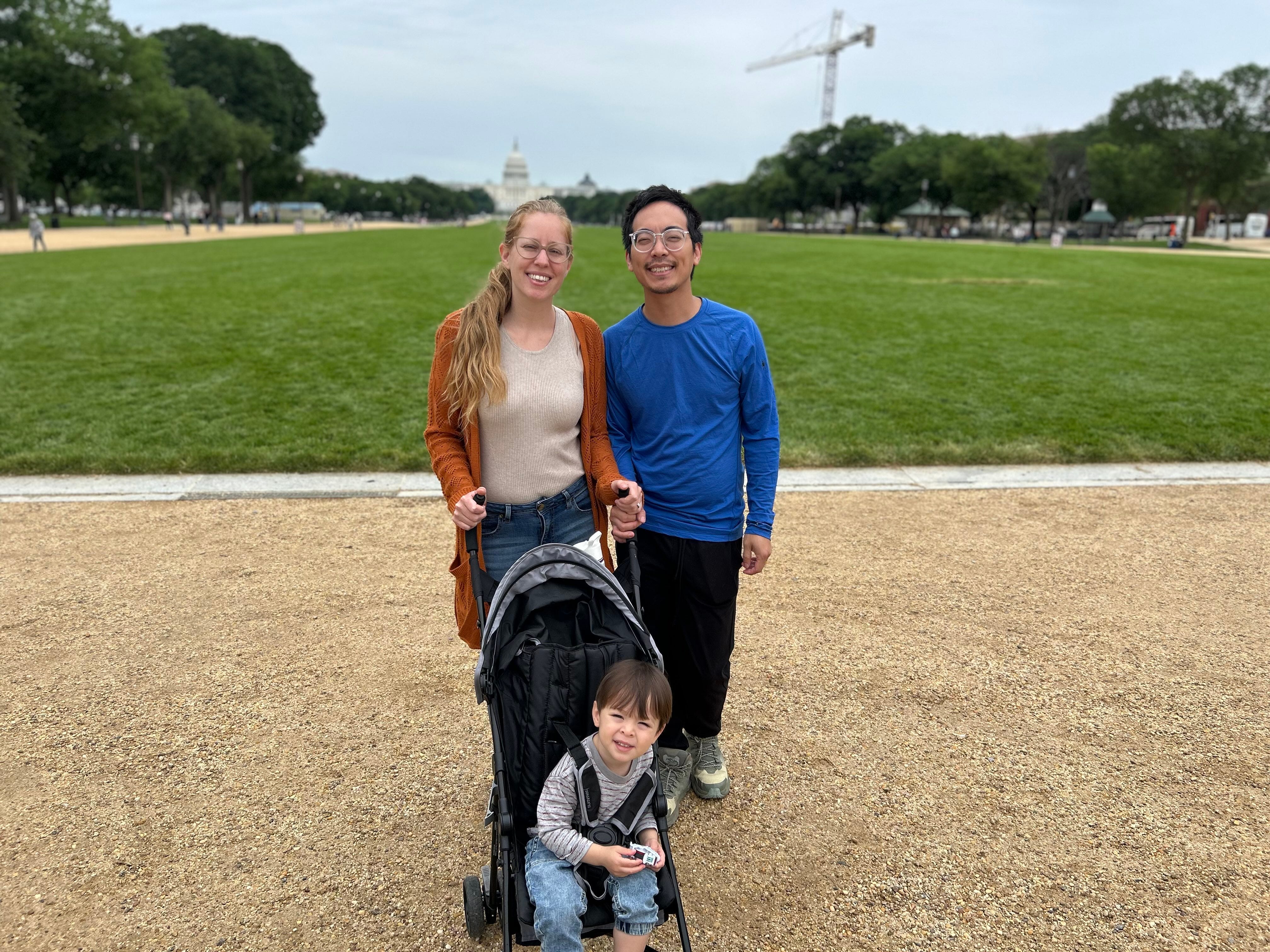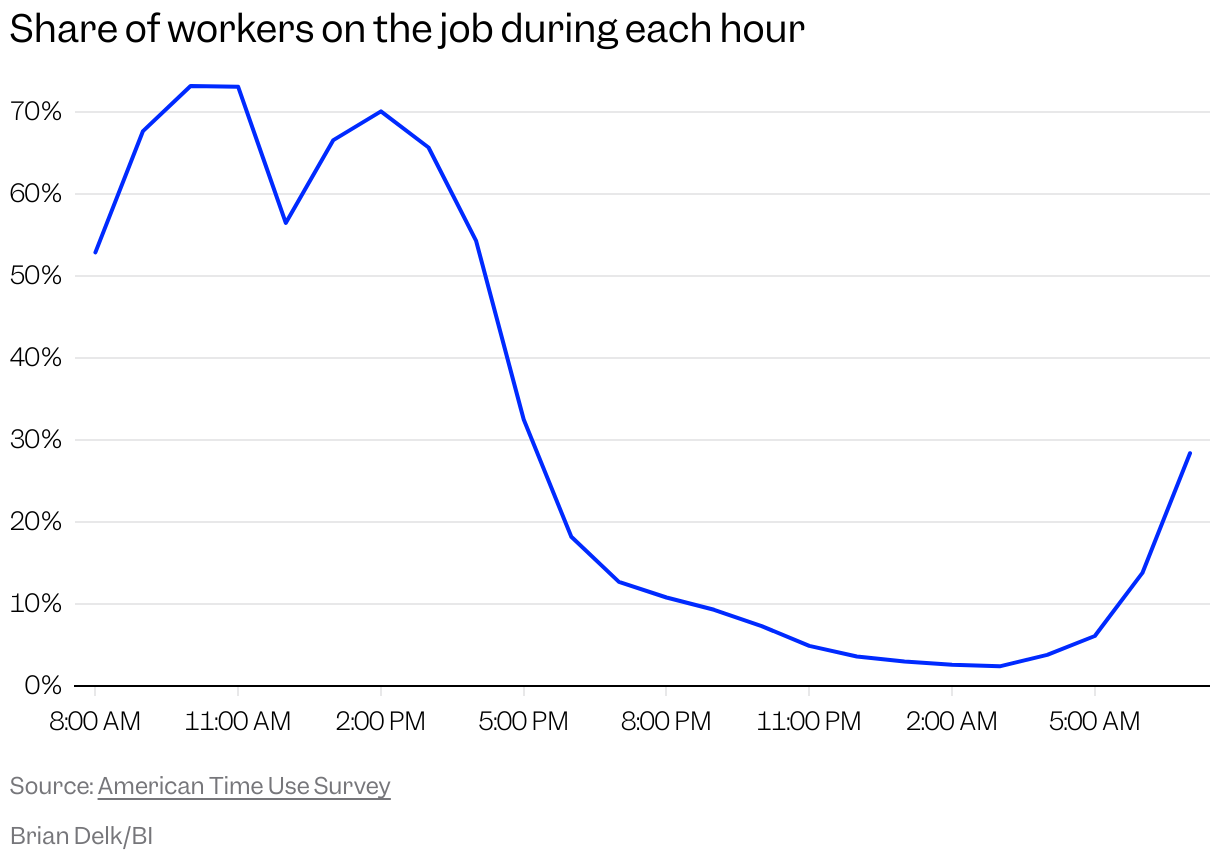
Rochelle Cooper
- Moms working outside traditional 9-to-5 hours often struggle to find affordable childcare solutions.
- Parents are waking their kids up before sunrise and leaning on grandparents to get to work on time.
- One startup is working toward a solution for these workers’ woes.
Melinda Turner starts her day at 3:30 a.m., and within 30 minutes, wakes her 8-year-old daughter for school.
She packs their bags and by 5 a.m., heads out to drop her child at an in-home day care — one of the few providers in her area that opens before dawn. Turner, a single mother, then drives to her early shift at a manufacturing job.
Most of the day care’s clients work as EMTs, nurses, or in manufacturing jobs, she said. “We’re the ones who work the weird hours,” the High Point, North Carolina, resident said of the day care clients.
As of 2018, nearly 6 million employed parents work outside the hours of 6 a.m. and 6 p.m. Like Turner, they need childcare at odd hours. Nurses, manufacturing workers, food service workers, and various shift workers who clock in before sunrise or work past the twilight hours are forced to find creative solutions to childcare.
Finding care can be challenging. Some parents can lean on grandparents. A handful of startups and companies have begun offering off-hours childcare. But for many parents, there remain few options.

Turner said she has no other options within her budget and commute. Many parents feel the same strain on their wallets as childcare costs outpace inflation.
“You got to find areas to cut corners, and lots of times when you’re having to pay for the childcare and the mortgage and you get the most important bills, sometimes you have to chip away at, I hate to say this, you have to chip away at the groceries,” Turner said.
Getting help from the grandparents
Unlike Turner’s daughter, who spends part of her day in school, kids under 6 years old require care around the clock. Some people lean heavily on their parents to help carry the load, which can come with its own tradeoffs.
Rochelle Cooper, 34, a pastry chef expecting her second child, said her husband’s parents moved in with them to care for their grandchildren and help with other household responsibilities.
Cooper’s husband is also a chef. They typically work over 40 hours each per week, and often work late into the night. Since her in-laws moved in with them, they don’t have to find a day care. There are still some drawbacks.
“It’s not perfect. Anyone who has in-laws will tell you that they don’t always agree,” Cooper said. “And so the consequences are I have less control over and say in how my child is parented, if you will, throughout the day.”
In Long Beach, California, Mihiri Weerasinghe, 35, said she tag teams daily with her husband and mom in taking care of their 22-month-old son. Weerasinghe works in shipping and logistics.
Her husband watches their toddler until 10 a.m., then drops him off with Weerasinghe’s mom and logs on to his remote job in film post-production. Weerasinghe picks up the child around 3 p.m. after her shift ends and spends the rest of the day with him. She said the schedule generally works with their son’s naptime and her mom’s remote work schedule.
“Even if I wanted to put him into day care, I couldn’t afford it,” she said. “Monetarily, it didn’t make sense for me to spend a little under half of my paycheck to have some other person raise my son while I’m working.”

Mihiri Weerasinghe
How companies can help strained parents
As of 2019, more than a third of children under 6 in working families — about 4.6 million kids — had parents with nontraditional work hours.
Two former Stanford grad students started a company focused on helping this group of parents.
Sarah Alexander and Olivia Rosenthal are cofounders of Patch Caregiving, a company specializing in bringing childcare on-site on short notice for employees. The care company was recently acquired by Wellthy, a care concierge service that connects people with day cares, elder care services, and more.
The cofounders interviewed employees at companies like UPS and healthcare workers and found that last-minute backup care was a primary pain point for frontline workers.
“For us, the vast majority of our bookings happen under 48 hours in advance of needing care,” said Alexander, often because a sick child or parent who needs extra attention that day forces a caregiver to call out sick from work to take care of their family’s needs.
Rosenthal explained that shift workers often rely on friends and family as a primary form of care.
Delivering packages and maintaining warehouses is an around-the-clock job, and parents at UPS needed care at uncanny hours. Patch worked with the employer to convert old break rooms, unused conference rooms, and trailers that sat next to distribution centers into colorful, kid-friendly day care rooms.
Parents could then drop off and pick up their kids on-site, removing the hassle of outside daycares or paying for babysitters. In these cases, the company sponsored these services, lightening the load on parents’ wallets.
A Boston Consulting Group study on UPS workers’ access to childcare showed a retention increase from 69% to 96% over a three-month period using Patch.
“Our emergency childcare program gives working parents in our operations a reliable back-up childcare option. In turn, the program helps us to prevent absences and ensures our business continues to run on time,” said Danelle McCusker Rees, senior vice president and global head of talent of learning & culture at UPS.

Katie Wallace
Reshma Saujani, founder and CEO of Moms First, an advocacy group for working moms, said making childcare accessible at work is “how you keep your workforce afloat.”
“Child care isn’t a perk. It’s not a ‘nice to have’ incentive like gym membership reimbursement,” Saujani added. “It’s an investment in your people and, honestly, in your business’s bottom line.”
Katie Wallace, 30, a mom of three boys and a nurse, said using Patch for over a year has lightened the load for her and her husband. She works 12 hours a day and is clocked in by 6:45 a.m. She typically leaves after 7 p.m. or later.
“If I have to call off for my shift because of childcare, it doesn’t just affect me; it affects the whole hospital and the patients. The hospital relies on a certain number of nurses to provide care in safe nurse-to-patient ratios,” Wallace said.
Read the original article on Business Insider
The post Meet the parents working ‘weird hours,’ clocking in before dawn, and scrambling for childcare appeared first on Business Insider.




